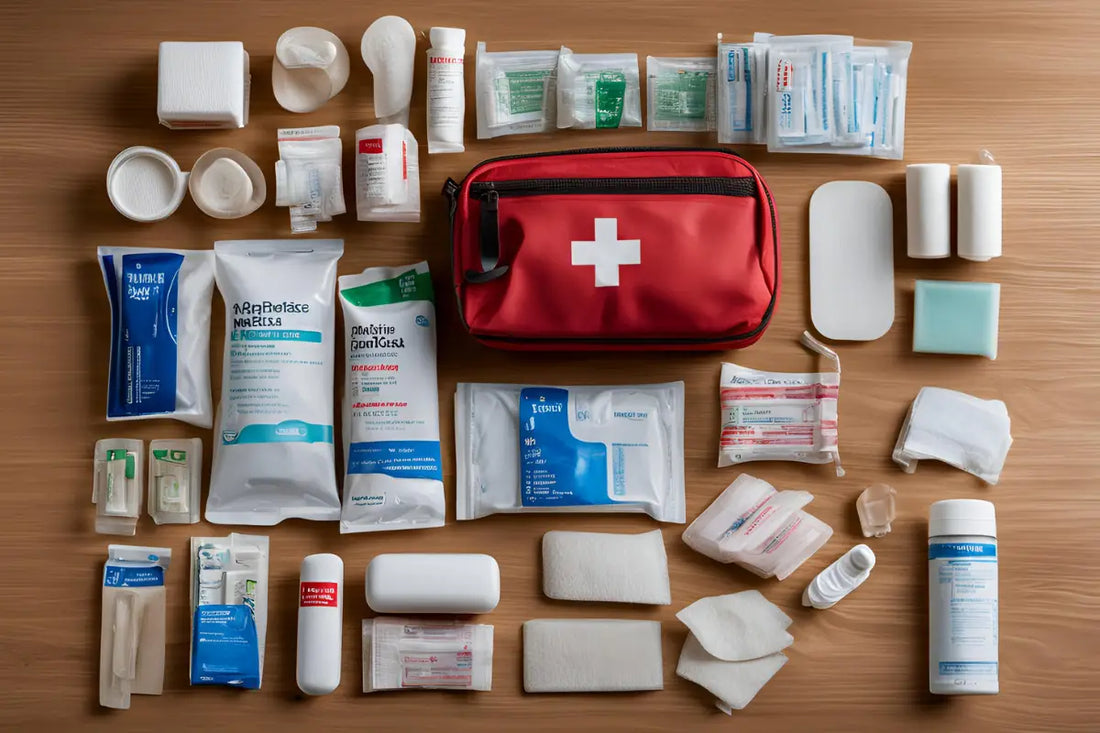
What Every Day Carry (EDC) Medical Gear Should I Carry?
In the realm of personal preparedness, your Every Day Carry (EDC) is not just about the tools you choose to help navigate your day-to-day life but also about ensuring you're equipped to handle emergencies. A critical but often overlooked component of a comprehensive EDC kit is medical gear. Whether you're an outdoor enthusiast, a responsible firearm owner, or simply someone who likes to be prepared, carrying medical gear can make a significant difference in emergency situations.
In this article, we'll cover the essential medical items you should consider including in your EDC kit. These items are compact, lightweight, and versatile, making them easy to carry without sacrificing preparedness. The goal is to equip you with the tools to manage common injuries, trauma, or health issues you may encounter in your day-to-day life.
A tourniquet is one of the most critical medical tools to have in your EDC, especially if you carry a firearm or engage in outdoor activities. In the event of a severe injury that results in heavy bleeding, a tourniquet can help stop the bleeding and potentially save a life. Look for compact, one-handed tourniquets that are easy to apply in a stressful situation.
-
Product recommendation: CAT Combat Application Tourniquet
The CAT is a military-grade tourniquet that's designed for fast and effective application. Its windlass system ensures that the tourniquet applies the necessary pressure to stop arterial bleeding quickly.
Why carry it?
Uncontrolled bleeding from limbs can lead to death in minutes. Having a tourniquet on hand allows you to respond to traumatic injuries, particularly from accidents or gunshot wounds.
Trauma shears are heavy-duty scissors that are designed to cut through tough materials such as denim, leather, or even seatbelts. In an emergency, you might need to quickly expose a wound or remove clothing to apply medical treatment. Trauma shears allow you to cut through materials quickly and efficiently without causing further injury.
-
Product recommendation: Leatherman Raptor Shears
These shears are foldable, lightweight, and come with additional tools like a strap cutter and a glass breaker, making them a versatile addition to your EDC.
Why carry it?
When seconds count, trauma shears make it easy to remove clothing or gear to assess and treat injuries. They're also handy for general cutting tasks in non-emergency situations.
A pressure bandage is designed to apply direct pressure to a wound, helping to control bleeding. Unlike a regular bandage, it can also act as a temporary tourniquet if used correctly. Pressure bandages are especially useful for treating larger wounds or injuries where a tourniquet isn't appropriate, such as injuries to the torso or head.
-
Product recommendation: Israeli Bandage 4-Inch
The Israeli bandage is a compact, lightweight option that's easy to carry and designed for rapid self-application. It's trusted by military personnel worldwide for its effectiveness in emergency situations.
Why carry it?
A pressure bandage gives you the ability to control heavy bleeding without the need for additional tools. It's an essential piece of gear for treating traumatic injuries until professional help arrives.
Hemostatic agents are substances that help promote blood clotting, which can be critical in situations where a tourniquet or pressure bandage isn't enough. These agents are typically found in gauze form and can be packed into a wound to control bleeding in areas where a tourniquet cannot be applied, such as the neck or groin.
-
Product recommendation: QuikClot Combat Gauze
QuikClot is a well-known hemostatic agent that has been used in military and civilian trauma care. It's designed to stop bleeding within minutes and can be a lifesaver in critical situations.
Why carry it?
Carrying a hemostatic agent gives you the ability to treat wounds that might not be manageable with a tourniquet or pressure bandage alone. It can stop life-threatening bleeding and give you precious time to get professional medical help.
A chest seal is essential for treating penetrating chest injuries, such as those caused by gunshots or stabbings. These injuries can lead to a collapsed lung, a life-threatening condition. A chest seal helps prevent air from entering the chest cavity, stabilizing the patient until they can receive medical care.
-
Product recommendation: HyFin Vent Chest Seal
The HyFin Vent Chest Seal is a popular choice for EDC due to its compact size and ease of use. It includes a one-way valve that allows air to escape from the chest cavity while preventing air from entering, reducing the risk of tension pneumothorax.
Why carry it?
If you or someone else suffers a penetrating chest wound, a chest seal can help prevent further injury and buy time for emergency responders to arrive.
Having a pair of nitrile gloves in your EDC kit ensures that you can treat wounds or injuries without risking contamination. Bloodborne pathogens can be a serious risk when providing first aid, so gloves help protect both you and the person you're treating.
-
Product recommendation: Black Nitrile Gloves (Rescue Essentials)
These gloves are puncture-resistant and offer a high level of protection, making them ideal for emergency medical situations. They're also lightweight and easy to store in any EDC kit.
Why carry it?
Nitrile gloves are a simple yet essential piece of gear that provides protection when dealing with bodily fluids or injuries.
In the event that you need to perform CPR, a CPR mask or face shield helps protect both you and the person you're assisting by preventing the transmission of infectious diseases. These masks are compact, easy to carry, and can be the difference between life and death in a cardiac emergency.
-
Product recommendation: Rescue Essentials CPR Face Shield
This compact face shield is designed for one-time use and features a one-way valve to protect the rescuer from exposure to bodily fluids.
Why carry it?
CPR masks or face shields allow you to perform life-saving CPR without worrying about contamination, making them a must-have for any complete EDC medical kit.
Medical tape is an often-overlooked but highly versatile item for any EDC kit. It can be used to secure bandages, gauze, or dressings in place, and can also serve as an improvised splint or tourniquet in a pinch. Look for durable, waterproof medical tape that can withstand the elements.
-
Product recommendation: 3M Micropore Medical Tape
This tape is hypoallergenic, strong, and waterproof, making it ideal for emergency situations. Its small size makes it easy to carry in any EDC setup.
Why carry it?
Medical tape is lightweight and can be used for a wide range of first-aid applications, from securing bandages to stabilizing splints.
Burns can happen unexpectedly, whether you're at the range, out camping, or dealing with an accident in everyday life. Burn gel or a specialized burn dressing can help soothe the pain, protect the wound, and prevent infection until you can seek further treatment.
-
Product recommendation: WaterJel Burn Dressing
This sterile, gel-soaked dressing is designed for immediate application to burns, cooling the wound and providing relief from pain.
Why carry it?
Burns are a common injury, and having a quick and effective way to treat them can prevent further complications.
- Personal Medications and Extras
While the items listed above cover trauma and emergency care, don’t forget to include any personal medications you might need. If you have allergies, carry an EpiPen. If you’re prone to migraines, bring your prescribed medication. Additionally, consider including items like ibuprofen, antihistamines, or other over-the-counter medications that might come in handy.
Why carry it?
Carrying personal medications ensures that you’re prepared for your specific health needs in any situation.
A well-rounded EDC medical kit can mean the difference between life and death in an emergency. While it might seem like a lot to carry, most of the items mentioned are compact and easy to store in your daily bag, vehicle, or even in specially designed EDC pouches. It’s about being prepared for the unexpected, whether it’s a minor injury or a life-threatening situation.
When selecting medical gear for your EDC, remember to periodically check expiration dates and replace items as needed. It’s also essential to be familiar with how to use each item effectively—taking a basic first aid or trauma course can give you the confidence and knowledge to act when seconds matter.
Want to upgrade your EDC medical gear? Visit OpticsPlanet.com to shop for high-quality medical supplies to enhance your preparedness.




